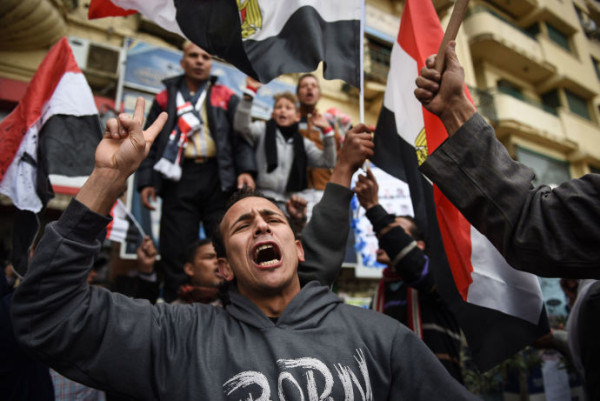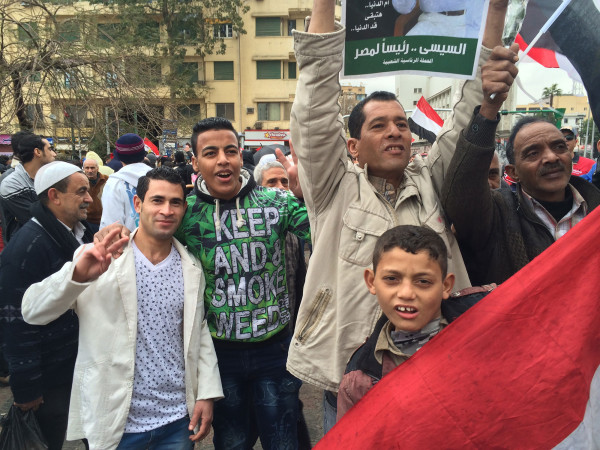PBS: Escaping Eritrea … [Read More...] about ካብ ውሽጢ ቤት ማእሰርታት ኤርትራ
A Rainy Anniversary in Tahrir Square

Monday was the fifth anniversary of the beginning of the Egyptian revolution, and the most interesting thing that I saw on Tahrir Square was either the rain or a young man wearing a hoodie that said in English, in huge letters, “Keep And & Smoke Weed.” Nothing seems to unnerve Egyptians more than rain—even January, which on average is the rainiest month of the year, usually sees less than a third of an inch of precipitation. This afternoon, a steady drizzle began at around one o’clock, peacefully dispersing many members of a small but vocal crowd that had gathered on a corner of the square, on what is also National Police Day, to show their support for the government.
Despite the rain, some diehards held their ground. There was a man in his sixties named Mohammed el-Fonz, who had travelled three hours by train, from Bahariya Oasis, to hold up a sign with a picture of President Abdel Fattah el-Sisi and the words “God is with You.” Fonz had decorated his trousers so that his left leg said, in big Arabic letters, “YES,” while the right leg declared, “SISI.” When I asked Fonz for his opinion of the revolution that began on January 25, 2011, he said that it was “one hundred per cent good.” But he’d also liked Hosni Mubarak, the former President who had been the target of that movement. “He was a good man, but he allowed the Muslim Brotherhood to become strong,” Fonz explained. “He weakened the country, which prepared the way for Mohamed Morsi to become President.”

While we were talking, the young man wearing the “Keep And & Smoke Weed” hoodie showed up. The words were backed by a neon-green marijuana-leaf print. The young man was in his twenties, and for a moment I wondered if the revolution had swerved onto familiar territory—I have a home in Colorado—but when I asked if the young man knew the meaning of the shirt’s message, he shook his head. I translated, and he and his companion exploded into laughter and gave each other a happy-slap Egyptian handshake— best National Police Day ever! When an old woman saw me taking notes, she introduced herself as Hagga Zeinab and told me that she had come to the square because she needed help. “My husband is sick and he can’t work,” she said. “I’m not a beggar. I don’t want money. I just want to have a small kiosk where I can sell things like sugar and cooking oil.” She reached into a bag and produced a grim medical report from a local hospital (“average-size liver shows small focal calcification at segment 7”), along with a newspaper article that featured her picture under the headline “A Dream of a License for a Kiosk.”
Tahrir conversations can be dizzying, and in the same way it’s hard to make much sense of the movement that began in 2011. There’s no shortage of data and analysis—for example, the Tahrir Institute for Middle East Policy just released a thorough and damning report on the political and economic state of the country. But then there’s the fifth-anniversary survey that was recently conducted by Baseera, an independent organization also known as the Egyptian Center for Public Opinion Research. As part of the survey, Baseera asked the question “Do you think that the country is doing better, the same, or worse than it did before the January 2011 revolution?” Of the respondents, only nineteen per cent responded “worse.” Nearly seventy per cent were positive—thirty-nine per cent responded that the country is “better,” while twenty-nine per cent said “much better.” Meanwhile, the New York Times and other publications have reported on a heavy-handed crackdown on journalists and cultural organizations in preparation for Monday’s anniversary.
So what’s the real situation? Sometimes I feel like the most useful thing that I’ve learned about Egypt can be summed up as: It doesn’t have to make sense. Or perhaps it’s better to say that many different and apparently contradictory things can be true at the same time. It’s possible that Egypt’s economy and political life have been badly damaged in the post-Tahrir era, but that the majority of citizens still, for whatever reason, respond positively to a survey about the aftermath of the revolution. It’s possible for a man to travel three hours to celebrate the fifth anniversary of a revolution, and yet speak fondly of the leader who was toppled by that movement. It’s even possible for somebody to speak well of both Sisi and Morsi—I’ve had that particular conversation on a number of occasions, most recently on the night before the anniversary, while buying oranges.
It’s also possible for the Egyptian security forces to engage in heavy-handed preparations for an anniversary that, at this point, means little to the majority of the population. In an authoritarian state, you can have repression without active dissent—the relationship between these elements is not necessarily logical or causal. It’s surprising how little sense of crisis or anger is apparent these days in Egypt, and how little energy seems directed toward political life. For most people the beginning of the Arab Spring seems far away, and they are much more likely to compare their current situation to the first half of 2013, when Morsi was in power and the country appeared to be much closer to collapse, with repeated shortages in electricity, gasoline, and other basic goods. In comparison, the sporadic acts of terror from the past two years seem much less threatening to the average citizen, especially since there’s a tendency for attacks to be focused on Sinai. And in this climate even the police work can feel surprisingly uneven. Over the past year, I’ve made nearly a dozen long trips to the south, where I’ve had remarkably little contact with the security forces. In October, I made a ten-day, thousand-mile trip—a foreign journalist, travelling alone, in his own vehicle—without being asked a single question by a security officer.
On Monday the police were out in force at Tahrir, but when I visited there wasn’t much for them to do. On the way back to my car, I saw a group of four uniformed officers and a police dog huddled into a stairwell of the parking garage, hiding from the weather. The rain-covered streets were empty when I drove home. Maybe that was the most memorable thing about the anniversary—I couldn’t think of the last time I’d heard the sound of windshield wipers in a car.
